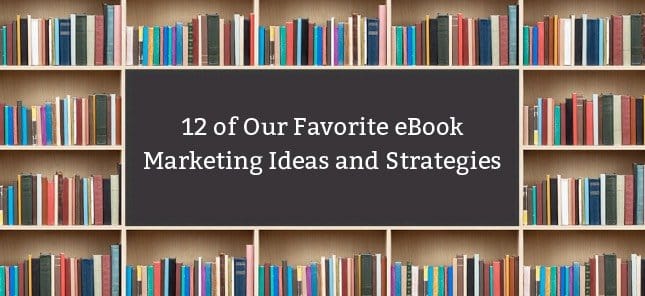12 of Our Favorite eBook Marketing Ideas and Strategies

It’s easy to wonder why so many marketers are writing eBooks. What’s the difference between a 2,000-word eBook and a 2,000-word blog post? For many, there isn’t one. The content is largely the same. The writer is the same. The insights are the same. What makes eBooks so special, then?
The reality is that eBooks often tend to include either more content or deeper content. Instead of a 2,000-word eBook, it might be 12,000 words. Or, it might still be 2,000-words, but it might dig much deeper into the content at hand, trusting the reader to have read the content it was based on. Where blog posts are beginner and intermediate, eBooks are intermediate and advanced.
Of course, there’s also the gate. In order to successfully market with an eBook, it needs to be gated. You can’t just post a plain link to it and get nothing in return; there’s no reason to make it an eBook instead of a blog post then. The gate gets you, as a marketer, something out of your book. You might be selling it for a small fee, or you might be requiring a survey answered, or you might require an email opt-in. The user, then, sees that you’re not just giving away your content, so it must be more valuable than your normal blog posts. More perceived value = more actual value.
Convinced? I am. Now that you’ve written your eBook – You can pause here and go write one, I’ll wait – here are a bunch of good strategies to market it.
1. Hold a Contest
Everyone loves a good contest. Not many people will want to enter a contests for a chance to win your eBook, though. Not unless the book is normally priced exceptionally high and thus has a very high value. Instead, hold a contest to give away something of more value, like a local prize or a copy of your product. Give the top 100 runners-up copies of your book, or just give everyone who enters the book as a consolation prize.
The biggest problem with this method is that you’re not getting extremely targeted, interested readers. You have to be careful with the prize you give out as part of your contest, to keep your users as focused as possible.
2. Interviews
There’s a fabulous service called Help A Reporter Out, or HARO. When you’re marketing an eBook, you can register for HARO as an authority in your industry. When a reporter wants to run a story about your industry, they can come to you as a resource, and you can try to work in a citation to your eBook. This should get a link from their publication to your eBook, for added publicity. It’s surprisingly effective.
3. Reddit Promotion
Reddit is a huge social network based around link sharing and the accumulation of all things interesting online. They hate unsolicited promotion, but you can still find a way around their rules if you go about it the right ways. There are a few options.
- /r/books. You can go to this sub and talk about your book. Don’t be too promotional, particularly if you’re selling the book. Instead, use your position as an author to talk about the process of writing and marketing the book.
- /r/ama and /r/iama. Ask Me Anything and I Am A are two general interest informal interview and Q&A boards. If you have an interesting perspective on your industry or you’re a known name, you can start up an interview here and answer questions.
4. Reviews
Every time someone leaves a review of your book, a few things happen. One, you get social proof that someone read and liked your book. Two, you get fodder to use to further promote your book. Three, you get someone else out there who liked your book enough to leave a review, and that person can be convinced to further promote it just by being acknowledged. Of course, you can also use sites and services designed to maximize reviews.
5. Marketer Advocates
Pick a list of your favorite content marketers and influencers, particularly those in your industry. Actually, you probably already have a list that will work, just because you have a list of cool sites you follow in order to find content to write about or curate.
Send out messages to these marketers and influencers, either through email, their site contact forms, tip submission pages or social media pages. Tell them you like what they do and you’ve selected them for an advanced copy of your book. Send them a review copy and ask them to let you know what they think.
A lot of them won’t bite, but if even a few do, you have ready-made reviews from potent influential users in your industry, which helps immensely.
6. Social Media
It just wouldn’t be a list about marketing without mentioning social media. You already know most everything I’m going to say here, but it’s worth repeating; social media is the cheapest way to access the largest audience available online, and it’s all Facebook’s fault. Post for a while teasing your eBook in the lead up before publishing, to build up hype. Then post when it’s live, possibly with an added incentive to download.
7. Think Like Your Audience
One of the keys to successful marketing is to build audience personas and use those to guide your copy and advertising. There’s no difference between doing that and doing it with an eBook. Use personas to guide the content, the copy, the targeting for your ads and any other marketing efforts you make.
8. Update Older Books to Promote Newer Books
When you write a new book, you can send out an update of your old book with a page promoting your new book, or with links in a “also by this author” content list at the beginning. You can also take the time to make minor updates to keep your old book valuable.
9. Tag and Categorize
Unless the only place your book is available is on your site, you’re probably going to be putting it on sites like Amazon or Goodreads. On these sites, you can set categories and keywords to make your book more visible to users searching casually for new releases. Think of them like optimized keywords, only you need to remember that the keywords people use when searching for books are not the same sorts of keywords people use when searching Google.
10. Know What You Want
Don’t split your sales among different platforms with different requirements to convert. If you’re selling your eBook for $3, make sure it’s $3 on every platform. Sure, you can run a sale, but don’t try to sell it for $3 on your site, $5 on Amazon and $6 on Smashwords; it just won’t work. Likewise, don’t try to sell it for $3 on Amazon and give it away for an e-mail address on your site. Keep your objective consistent.
11. Make Your Book Good
You can have the best marketing in the world, but no one will read your book or leave you a review if the book is bad. You need a good, professional cover, you need a file format anyone can view, you need copy that’s free of typos and formatted nicely, you need images and charts, you need insights and information to back up your claims, and you need to present it in a professional package.
12. Start the Sequel
There’s no time to rest on your laurels when your book is live; you have more work to do. You should immediately begin compiling information for a sequel or an update. You can turn your eBook into a monthly release, or you can write supplemental books to expand on points you make in the main book. Always be writing; the life cycle of an eBook is short.
 ContentPowered.com
ContentPowered.com





Quite valuable James